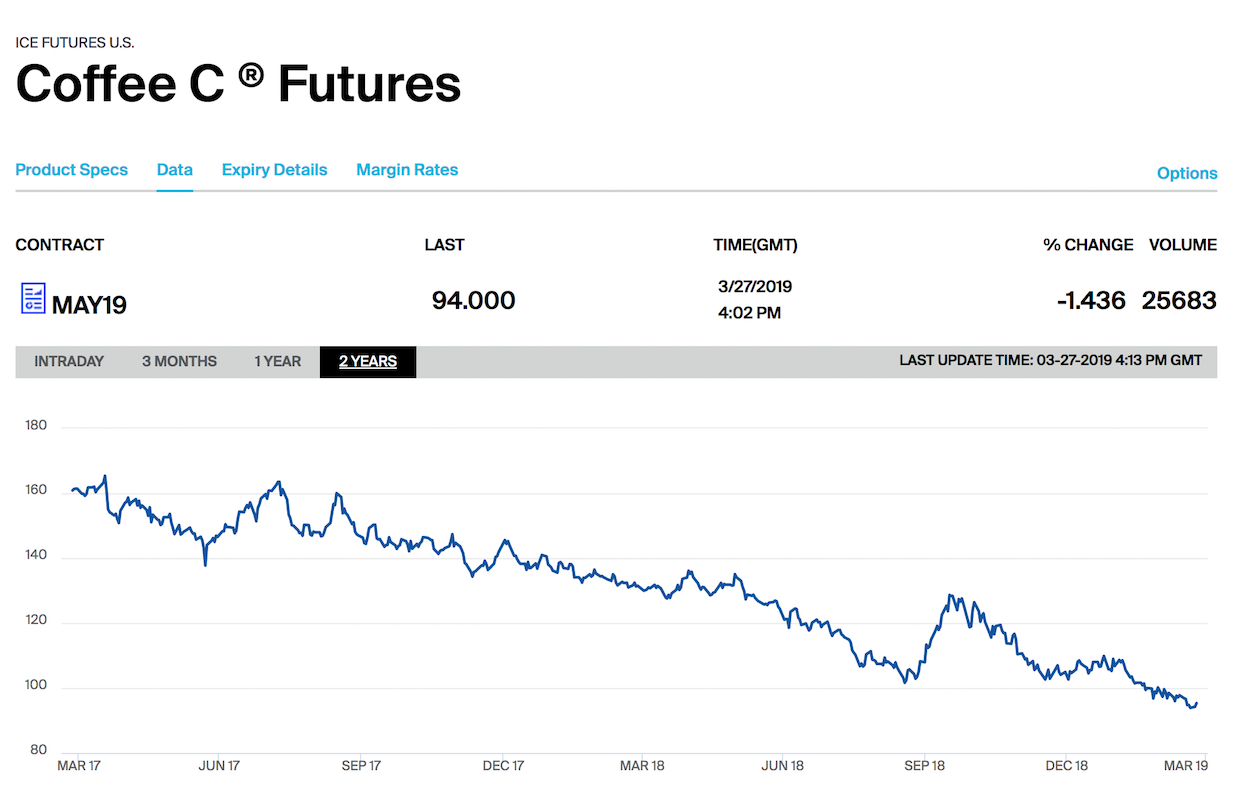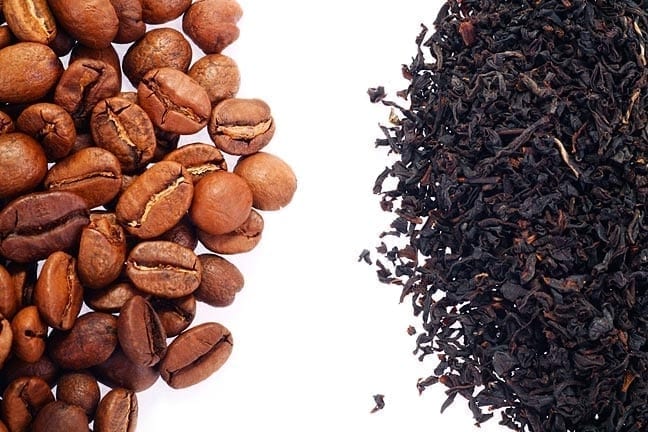If you are currently following a ketogenic diet, also called keto, then you have probably…

Coffee Producers Demand Immediate Action Amidst Price Crisis

A screenshot showing the current ICE Coffee C Futures price for May contracts, plus the past two years of C price movement.
A consortium of major organizations representing coffee producers throughout the world has issued a sweeping condemnation of the global coffee industry as the “C price” for coffee sits at historic lows.
Without immediate action to supply better collective prices to the world’s approximately 25 million smallholder farmers, the coffee industry may likely be contributing to a widespread humanitarian crisis as coffee farmers abandon coffee in favor of illicit crops or migrate in search of better opportunities, the group warned today.
Thirteen organizations representing the World Coffee Producers Forum — including Colombia’s FNC, Africa’s AFCA, Latin America’s Promecafe, Brazil’s BSCA and the United States/Europe’s Specialty Coffee Association — have attached their name to a declaration calling for immediate action in response to low coffee prices.
The groups are specifically addressing the ICE futures price for commodity coffee — often called the “C Price” — which is widely used as a price discovery and reference tool in the creation of futures contracts for transactions of green coffee. Throughout the coffee sector, the C price serves as a benchmark that affects prices at virtually all levels of the coffee trade.
“Producing countries and other players are concerned that today’s ‘C’ contract is not the right price discovery mechanism and that by allowing the impoverishment of producers, the coffee industry is compromising its own future,” the consortium of producer groups wrote in yesterday’s declaration.
Earlier this month, the C price for May futures fell to USD $0.9465 per pound, its lowest level since 2006. As of this writing, the C price for May contracts was $0.9400. In fact, coffee prices have been in a dramatic slump through much of 2018 into 2019, repeating a downward cycle in a coffee commodities market that has been highly volatile in a free market period since 1989.
“Today’s ‘C’ futures contract was created as the price reference for a basket of mild arabica coffees of similar quality known as ‘Centrals,’” the group wrote. “Today, with several changes introduced over time, it is widely acknowledged that the ‘C’ futures contract based price does not cover production costs for most producers due to several factors, including speculation by hedge funds that do not understand or care about coffee.”
DCN identified coffee prices as the top story of 2018, as we published dozens of news pieces and columns on the ongoing coffee price crisis. Colombian coffee leaders have suggested that the country’s producers find a way to bypass the C market altogether to try to find prices that can meet costs of production. Last October, producer groups from more than 30 countries sent an open letter to some of the world’s largest coffee roasting companies calling for action.
In today’s letter, signed by many of the same producer-representing organizations, the consortium acknowledged past pleas to actors on the traditional roasting/consuming side of the industry.
“Coffee farmers from all over the world have been reaching out for years to the rest of the value chain hoping for a collective, constructive and realistic approach to secure the economic sustainability of producers,” the group wrote. “The response — unfortunately — has been very weak.”
Here is yesterday’s declaration from the World Coffee Producers forum consortium, in full:
DECLARATION OF THE COORDINATION GROUP OF THE WORLD COFFEE PRODUCERS FORUM
NAIROBI, KENYA
MARCH 26TH, 2019
Nairobi, March 26th, 2019.- The current social and economic crisis created by extremely low international coffee prices has come to a point where the coffee value chain -as a whole- cannot just continue talking about it, without taking serious and immediate action.
According to the International Coffee Organization ICO, about 25 million families -mostly smallholders- produce coffee in the world. Today, most of them cannot even cover their production costs and many of them cannot make a living for themselves and their families
The world drinks 1.4 billion cups of coffee every day (*) and consumers pay very high prices for them (from $3.12 in the U.S. to $4.60 in Shanghai to $ 6.24 in Copenhagen in 2018 (**)). In many cases, those prices are reached with the promise of the coffee being sustainable. However, the sustainability promise usually focuses only on two of its three aspects: environmental and social. Economic sustainability, the income of the farmers itself, has been neglected by the coffee value chain under the premise that “the market is the market” and we need to let it rule.
Today’s “C” futures contract was created as the price reference for a basket of mild arabica coffees of similar quality known as “Centrals”. Today, with several changes introduced over time, it is widely acknowledged that the “C” futures contract based price does not cover production costs for most producers due to several factors, including speculation by hedge funds that do not understand or care about coffee.
In 1982, the price of coffee fluctuated between US$1.18 and US$1.41 in the international market and a cup of coffee averaged US$ 1.10 in the United States; in 2018, the average price of a pound of arabica coffee in the international market averaged US$1.01. Furthermore, on March 22nd, 2019, the price closed below US$0.95. Coffee producers have lost more than 80% of their purchase capacity in the last few decades.
The current pauperization process of coffee producers is destroying the very social fabric in the rural areas of more than 40 countries in Africa, Asia and Latin America, leading to increased criminality in producing nations, more poverty in the cities, and massive migrations towards the United States and Europe. In some countries, the current crisis has become an incentive to shift to illegal crops because farmers cannot make a living from coffee alone.
Quality and availability are also threatened. Producers who stay in coffee will not be able to afford the proper care of their farms and their coffee which leads to improper fertilization and care of the trees, affects quality and deprives consumers the diversity that they enjoy today. Adaptation and mitigation of the effects of climate change are other burdens that falls on the shoulders of producers.
Producing countries and other players are concerned that today’s “C” contract is not the right price discovery mechanism and that by allowing the impoverishment of producers, the coffee industry is compromising its own future.
The current economic sustainability crisis of coffee producers needs to be addressed immediately before it becomes a humanitarian crisis. An approach based on the principle of co-responsibility and total transparency must be implemented to ensure that all the links of the value chain are profitable and healthy. Even if a coffee results in a great beverage, if it does so at the cost of the dignity, value or well being of the people and the land involve, it cannot truly be a sustainable coffee. ICE cannot be absent in this discussion.
Coffee farmers from all over the world have been reaching out for years to the rest of the value chain hoping for a collective, constructive and realistic approach to secure the economic sustainability of producers. The response -unfortunately- has been very weak.
When it comes to economic sustainability of coffee producers, it is clear:
¡NO ACTION IS NOT AN OPTION!
* Source: International Coffee Organization
** Source: Statista
ACRAM – Agence des Cafés Robusta d’Afrique et Madagascar, Cameroun, Centrafrique, Côte d’Ivoire, Gabon, Madagascar, RDC, Togo
AFCA – African Fine Coffees Association: Burundi, Cameroun, DR Congo, Ethiopia, Ghana, Kenya, Malawi, Rwanda, South Africa, Tanzania, Uganda, Zambia, Zimbabwe
AMECAFE – Asociación Mexicana de la Cadena del Café
ANACAFE – Asociación Nacional del Café Guatemala
BSCA – Brazilian Specialty Coffees Association
CNC – Conselho Nacional do Café – Brazil
CONAPROCAFE – Coalición Nacional de Organizaciones de Productores de Café – México
FNC – Federación Nacional de Cafeteros de Colombia
IACO – Inter-African Coffee Organization
India Coffee Trust
PROMECAFE
México, Guatemala, Honduras, El Salvador, Nicaragua, Costa Rica, Panamá, Perú, República Dominicana, Jamaica
SCA – Specialty Coffee Association USA
VICOFA – Vietnam Coffee and Cocoa Association
Related
Nick Brown
Nick Brown is the editor of Daily Coffee News by Roast Magazine. Feedback and story ideas are welcome at publisher (at) dailycoffeenews.com, or see the “About Us” page located at the bottom of this site for contact information.







